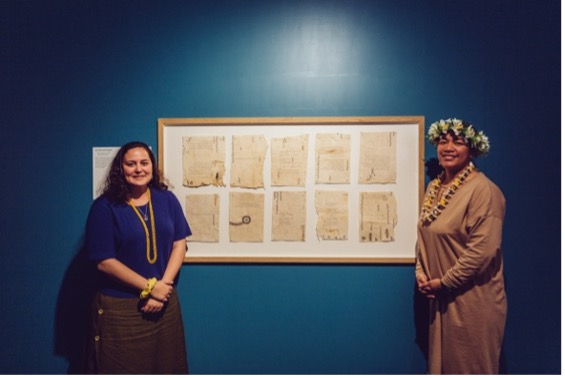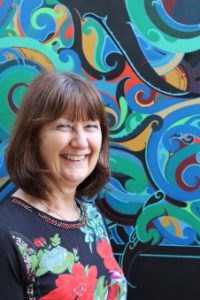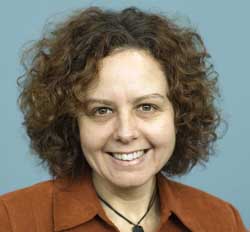Fast-Start Marsden on Niuean Texts
Fakaalofa lahi atu!
Congratulations to Dr Jess Pasisi on being awarded a FastStart Marsden grant worth $360,000, entitled “Mapping Niue texts in and beyond Aotearoa: Expanding on New Zealand Realm connections to Niue through archival texts.” Jess (Niuean (Mutalau, Hikutavake), Pākehā, Ngāti Pikiao, and Tahitian) is Te Tumu’s most recent academic hire and is based in our Pacific Islands Studies programme, and is already a promising researcher, having been awarded a Pacific Health Postdoctoral Fellowship by the Health Research Council to investigate Niuean happiness.

Jess Pasisi (L) and Cora-Allan Lafaiki Twiss at the Auckland Museum exhibition launch of “Archives of Emotion” in 2021, with their piece ‘Ko e Higoa Haaku ko Hiapo’. Photo courtesy of Auckland Museum.
Jess started putting the Mapping Niue texts project together while still based at the University of Waikato, with Professor Alice Te Punga Somerville as Associate Investigator. Professor Somerville has also moved, and is now at the University of British Columbia. She is well versed in literary projects, and Jess worked as a researcher with her in the “Writing the New World” project.
Jess’s Marsden project will be uncovering and analysing Niuean texts – with the meaning of “texts” interpreted quite broadly, comprising publications, manuscripts and other tāoga – with the aim of making these more available to Niuean people in Aotearoa New Zealand, Niue, and beyond. This also involves collaborating with Niuean communities, including cross-disciplinary work with tufuga (experts, practitioners), and encouraging Niuean people to engage with their local archives.
Research outputs include a book based on the project’s research, and the creation of a dataset of Niuean texts which will be invaluable to the wider Niuean community, as well as incoming researchers. Jess is planning three workshops as part of the project, one at Otago, one in Niue, and one at an international venue. Aligning with the aims of Marsden Fund to help develop future scholars, the project will also fund a Masters thesis scholarship, as well as some undergraduate summer scholarships.
We wish Jess well with her exciting new research project, and for a long productive career in academia.
Please also check out the Marsden Fund article for more details on Jess’s research.
Image information. Jess Pasisi wrote the poem for ‘Ko e Higoa Haaku ko Hiapo’ and Cora-Allan Lafaiki Twiss, a tagata Niue artist and practitioner, made it into an art piece that was purchased by the Auckland Museum. To read the poem, see images of the artwork, and more information, click here.
Fingers Crossed for Marsden Second Round
Te Pūtea Rangahau a Marsden/Marsden Fund is one of the most prestigious opportunities for externally-funded research grants, and highly competitive. The grants fund three-year research projects, as well as channel some income into the university. The Marsden Fund operates as a two-stage process. Although the quality of all the initial applications (where the research idea is pitched) tends to be very high, most applicants do not get invited to submit a full proposal. In the Humanities Panel just 26.1% got through to the second round, and in Social Sciences it was 22.6%. At the second round successfully gaining a grant then becomes a (roughly) 50/50 chance. So we can see, winning a Marsden is very hard, and getting through to the second round is worth acknowledging and celebrating.
It will now be an anxious time for our Te Tumu staff, Dr Lyn Carter and Dr Erica Newman, involved in preparing their full proposals.
Dr Lyn Carter is part of larger team led by Dr Pedersen Zari of Victoria University, with the project: Empowering Oceania Nature-based Urban Design: Knowledge sharing, Leadership and community Partnering in Climate Change Adaptation. This is a “standard” Marsden application, i.e. submitted by experienced researchers, most often as a team.
Summary: Climate change impacts settlements of Oceania, including Aotearoa, in significant ways. ‘Nature-based solutions’ (NbS) have great potential to address these impacts. Incorporating traditional knowledge into NbS will offer more culturally appropriate and long-term solutions, however links to wellbeing agendas have not been fully explored. This research investigates how well being can be strategically linked to ecologies, and how this can be harnessed to create ecologically resilient ‘Ocean cities’. Research into how the human-nature-climate nexus can be leveraged to enhance the effectiveness of NbS will make a significant contribution to the urban climate adaptation research in Aotearoa, the Pacific, and globally.
Dr Erica Newman project is a “fast-start” application, which are for early career researchers, often working by themselves. Her topic is: Journey Home: Descendants of Māori adoptees search for their tūrangawaewae.
Summary: Māori adoptees who have no knowledge of their Māori heritage pass the unknown to their descendants. Focusing on these descendants, this project will explore; how they identify with their taha Māori, avenues they have taken to connect to their taha Māori, and how they are accepted by their whānau and hapū. I will follow participants on their journey of discovery and will examine hapū membership eligibility. Oral narratives will be the primary base for this project with published and unpublished sources used to support and highlight issues the participants encounter. This will begin a new area of research that will highlight the issues of transracial adoption on identity and well-being for descendants of Māori adoptees in Aotearoa New Zealand. [Advisor: Associate Professor Angela Wanhalla.]
We all have our fingers crossed that Erica and Lyn’s projects make it through.



